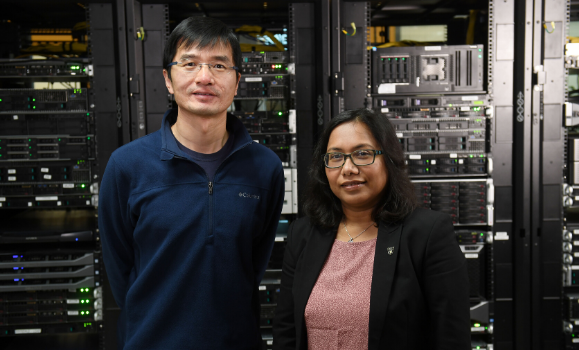» Go to news main
Networking a reliable future

Today, the internet is central in modern society and plays a big part in most of our lives – day in, day out.
With this comes complex challenges in efficiency, flexibility and security as we move increasingly to wireless network-based technologies through the Internet of Things (IoT) – the embedding of the internet and computing devices into everyday objects such as cars, electronic appliances and household systems – and Mobile Cloud Computing (MCC).
Researchers in the Faculty of Computer Science are teaming up to tackle some of the challenges posed by the ever-expanding use of the internet with funding announced last year through the Canada Foundation for Innovation’s (CFI) John R. Evans Leaders Fund (JELF).
Drs. Qiang Ye and Israat Haque, are leading one of many university-based projects that are benefitting from more than $42 million. Funding will help universities attract and retain top talent from around the globe – particularly early-career researchers – with equipment that will give them a competitive advantage in their field. Dr. Rita Orji from the Faculty of Computer Science also received funding for her work in persuasive and adaptive systems.
Reliability, security, performance
Dr. Ye and Dr. Haque’s funding will support research in two critical areas: mobile wireless networks and Software-defined Networking (SDN). Central to Dr. Haque’s research, SDN is an approach to network management that makes environments flexible and dynamic so that networks can be programmed to meet user demand and current needs.
Dr. Haque says we can “Think about this (research) from two angles.”
"One is from a user's perspective; they use various applications over different types of devices. Applications have different sorts of demands - some need very high bandwidth while watching a video or playing online games. The other side is the service providers' perspective. The providers have to make sure that the network is running smoothly to meet users' demands. Reliability, security, and performance are essential for both sides."
“New problems are introduced in terms of reliability and security when devices enter new environments,” adds Dr. Ye. “Here, security has to be considered carefully. When a device is fixed at one location it is easier but when a device moves reliability etc. can change.”
Complementing each other
When asked why they chose to work together, Dr. Ye says the simple answer is “Our areas complement each other so it makes sense to program into one project,” with his research focusing on the user perspective and Dr. Haque’s on the service provider side.

As Dr. Haque echoes, “Basically if you think of the two sides of the research, if one is missing the other one is not useful anymore. So, that’s where our common base is visible or applicable.”
Dr. Ye joined the Faculty of Computer Science from the University of Prince Edward Island in 2018, while Dr. Haque joined in 2017 from the University of California, Riverside.
Together, they are currently in the process of acquiring equipment and students for the project. They hope to train a total of 48 PhD, masters and undergraduate students over five years as well as build a mini ecosystem in which to conduct their research.
“We are going to mimic the real world,” says Dr. Ye. “So, we will have a network provider and user devices – we are creating a small but real environment in which to perform tasks.”
This will enable researchers to introduce new problems to this test environment, analyze risks and develop improved solutions.
Industry engagement
Ultimately, Dr. Ye and Dr. Haque’s research will result in algorithms, protocols, architectures that will be utilized in many applications, such as data centers, cloud networks, smart cities, e-business, and defense – enabling industry partners to embed research outcomes into products and services that will benefit Canadians in a multitude of sectors.
The project has already attracted engagement from industry partners including Cisco, OlsoNet Communications, and IGT. Partners will assist the project by integrating the solutions developed into their commercial products to verify their feasibility in practice.
Other anticipated real-world benefits of the project include the development of a machine learning based intrusion detection scheme to significantly improve the security of mobile cloud computing, and an SDN study that will influence partner organizations, such as Halifax Regional Municipality, to leverage a reliable, efficient, and programmable networking framework.
As well as external impact, Dr. Ye and Dr. Haque also believe their project will contribute to Dalhousie’s Research and Innovation Strategic Direction, in particular to the cross-cutting research theme of Big Data.
Recent News
- Ridwan Oladipupo's Articipay
- Calling all gamers: develop your own video game at Global Game Jam 2025
- Computer Science student’s startup promises to make driving safer
- Future alumni: Seif Elbayomi
- Computer Science alum says mentorship is a powerful tool
- Protecting our health, oceans, and future: Dal innovators celebrated at 22nd annual Discovery Awards
- Dal researcher is making smart home devices safer
- Tech triumph: Dalhousie wins big at 2024 Digital Nova Scotia awards
